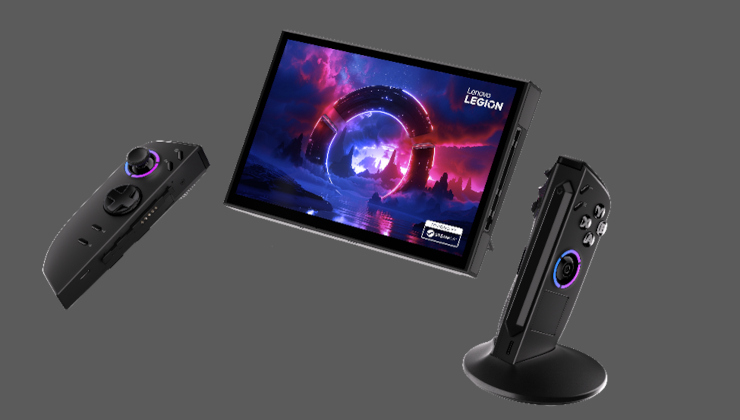After a bit of a false start with an announcement made too early, Google has now announced Steam for Chrome OS and Chromebooks and now Valve has done their own brief announcement. So it's all officially official now.
From Valve's announcement:
As of Monday this week, an early version of Steam for Chrome OS has been made available to developers. Google and Valve have been collaborating on this project, which will ship to end users sometime in the future. Because Chrome OS is a Linux-based operating system, it can leverage much of the work that Valve has recently done for Steam Deck to allow games to run well even when they don't have a native Linux build. Google engineers have worked to greatly expand the capability of Chrome OS to make this possible.
Much like for Steam Deck, Valve has made it clear that developers don't actually need to test their own games, as it's "up to Google and Valve to make sure compatibility for Chrome OS is as robust as possible". That said, nothing stops developers ensuring their native Linux builds are in good shape or testing their Windows builds with Proton on a Linux desktop / Steam Deck. If developers do test, they can report issues directly to [email protected].
Again, this is fantastic news for Linux gaming as a whole because Steam on Chrome OS is the Linux client. This gives developers more of a reason to care about Linux (on top of Steam Deck), and gives Valve another reason to keep the Linux client in good shape.
Quoting: denyasisI was always under the impression that most/many of the Chromebooks were lower powered ARM chipsets? I'm assuming this is for x86 systems only?Steam for ChromeOS is only for a few select devices, the reauitements for Steam on ChromeOS is i5/i7 CPU and 7 GB RAM. So very few of the Chromebooks.
Quoting: mr-victoryOh wow, thanks. Yeah I'm pretty sure that's totally beyond anything or local school systems use. Everything's web based, so the systems seem pretty basic.Quoting: denyasisI was always under the impression that most/many of the Chromebooks were lower powered ARM chipsets? I'm assuming this is for x86 systems only?Steam for ChromeOS is only for a few select devices, the reauitements for Steam on ChromeOS is i5/i7 CPU and 7 GB RAM. So very few of the Chromebooks.
Quoting: denyasisI was always under the impression that most/many of the Chromebooks were lower powered ARM chipsets? I'm assuming this is for x86 systems only?I also assumed that this is for >ARM< based systems...
So, no Steam for ARM yet? :sad:
Last edited by Boldos on 26 Mar 2022 at 4:34 pm UTC
Quoting: denyasisYeah, why the little buggers are so cheap. I mean, I don't think all that much of ChromeOS, but my wife has one and when we bought I was going "It costs how little?"Quoting: mr-victoryOh wow, thanks. Yeah I'm pretty sure that's totally beyond anything or local school systems use. Everything's web based, so the systems seem pretty basic.Quoting: denyasisI was always under the impression that most/many of the Chromebooks were lower powered ARM chipsets? I'm assuming this is for x86 systems only?Steam for ChromeOS is only for a few select devices, the reauitements for Steam on ChromeOS is i5/i7 CPU and 7 GB RAM. So very few of the Chromebooks.
So, the numbers of people using this will probably be pretty low even though there's a surprising number of Chromebooks all told.
However, every so often there are signs that Google want to gradually migrate Chromebooks up the food chain. This is probably more about future, beefier Chromebooks than current ones. I presume they've realized that as soon as they have Chromebooks with enough oomph that they cost like a normal laptop, they will face questions about whether it can do anything, and specifically noticed the problem desktop Linux has been dealing with all these years--people won't shell out for a real laptop if it won't play their games.
"Google vs Microsoft! Round 2! Fight!!"
Round 1 is obviously the market for smart phones. And we know the winner :grin:
I suppose current Chromebooks might make a good streaming client, right?
Quoting: mr-victoryThis situation sounds to me like this:That fights over, I think. I have a number of family and friends in education. I also moonlight at a local college. Google owns the primary school market in my country. Microsoft's position is they'll pick them up at the college and university level and they own that space.
"Google vs Microsoft! Round 2! Fight!!"
Round 1 is obviously the market for smart phones. And we know the winner :grin:
It makes for some funny moments. Since new college students don't understand certain computer concepts, like saving thier work, having never had to do it before with Google. One of my friends, a university professor, almost always has a few students every year that lose their first paper because they never saved it when they exit Word.
I'm glad I've never had to deal with that. Hardest thing I run into is trying to update and make PowerPoints using LibreOffice, lol
Quoting: BoldosThat would change nothing. Wine (Proton) still doesn't work on ARM.Quoting: denyasisI was always under the impression that most/many of the Chromebooks were lower powered ARM chipsets? I'm assuming this is for x86 systems only?I also assumed that this is for >ARM< based systems...
So, no Steam for ARM yet? :sad:
Quoting: mr-victoryThis situation sounds to me like this:round 1 was google vs windows live search, then bing.
"Google vs Microsoft! Round 2! Fight!!"
Round 1 is obviously the market for smart phones. And we know the winner :grin:
round 2 was android vs windows phone.
as for the round 3, we are years into this battle.
honesly i dont trust google anymore, they seem to want to play this game as an winner takes it all approach, android didnt helped linux desktop, stadia dont seem to help much either, and steam seem to be their last option to bring games to chromebooks to fight the OS war, their plan B.
Quoting: tuxintuxedoCodeweavers CrossOver runs on ARM based Macs and you can play games on it.Quoting: BoldosThat would change nothing. Wine (Proton) still doesn't work on ARM.Quoting: denyasisI was always under the impression that most/many of the Chromebooks were lower powered ARM chipsets? I'm assuming this is for x86 systems only?I also assumed that this is for >ARM< based systems...
So, no Steam for ARM yet? :sad:
Quoting: tuxintuxedoThat would change nothing. Wine (Proton) still doesn't work on ARM.Seems to me [Wine works](https://www.youtube.com/watch?v=oEOLGz198e4) with Box86 / Box64 on ARM. Here's a year old [blog post](https://box86.org/2021/05/arm-gaming/) about it from Box86. Might also work with [Fex-Emu](https://github.com/FEX-Emu/FEX).
Quoting: rustybroomhandleCodeweavers CrossOver runs on ARM based Macs and you can play games on it.And also on Chrome OS
Quoting: rustybroomhandleThrough Rosetta 2. You need an emulation layer for that (x86).Quoting: tuxintuxedoCodeweavers CrossOver runs on ARM based Macs and you can play games on it.Quoting: BoldosThat would change nothing. Wine (Proton) still doesn't work on ARM.Quoting: denyasisI was always under the impression that most/many of the Chromebooks were lower powered ARM chipsets? I'm assuming this is for x86 systems only?I also assumed that this is for >ARM< based systems...
So, no Steam for ARM yet? :sad:
On other ARM devices things like QEMU is needed for the same reason.
Crossover's Chrome OS support is limited to Intel CPUs.
Last edited by tuxintuxedo on 27 Mar 2022 at 9:26 am UTC
Looks like there is still a lot of very tricky work to do.
Quoting: tuxintuxedoWell, sorry, but that was not the point (and I did not clarify it enough).Quoting: BoldosThat would change nothing. Wine (Proton) still doesn't work on ARM.Quoting: denyasisI was always under the impression that most/many of the Chromebooks were lower powered ARM chipsets? I'm assuming this is for x86 systems only?I also assumed that this is for >ARM< based systems...
So, no Steam for ARM yet? :sad:
Of course I do not expect to play Cyberpunk or Witcher on RaspberryPi anytime soon...
What I meant was the fact that Steam for ARM would bring "some more" games to Linux+ARM platform combo; it would serve as a stable distribution platform, e.g. for native Linux-built games (and there are tons of those, which would run on e.g. ARM-based Raspberries or Chromebooks pretty nicely).
And that - in itself - would mean a lot!
Quoting: denyasisI was always under the impression that most/many of the Chromebooks were lower powered ARM chipsets? I'm assuming this is for x86 systems only?It's kind of odd timing because a lot more Chromebooks ran on x86 architecture a few years ago. I'd say maybe even the majority did, but as Google pushed for more integration with Android apps, it also made sense to gradually shift Chromebooks more to ARM. Steam on ChromeOS made sense more in 2017 than it does now. I even have an x86 Chromebook that will stop receiving updates this June. I've already had it in dev mode for quite some time, and it will switch to a full-time Linux laptop pretty soon.











 How to setup OpenMW for modern Morrowind on Linux / SteamOS and Steam Deck
How to setup OpenMW for modern Morrowind on Linux / SteamOS and Steam Deck How to install Hollow Knight: Silksong mods on Linux, SteamOS and Steam Deck
How to install Hollow Knight: Silksong mods on Linux, SteamOS and Steam Deck